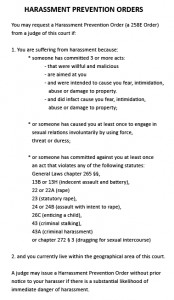If you have been served with a protective order in Boston, you are not alone. Every year, thousands of Massachusetts citizens, mostly men, are falsely accused of abuse of many kinds, resulting in restraining orders being issued against them. But with the right information and legal counsel, you can defend yourself against the alleged plaintiff’s accusations. Hiring the right restraining order defense attorney in Massachusetts might be the best decision you ever make. Continue Reading
Articles Posted in Restraining Order
How to Protect Yourself Against Restraining Order Abuse and Manipulation
In an ideal world, a restraining order would serve only to protect an innocent party from a former partner’s acts of abuse. However, the court system is designed to look out for the rights of women and often allow an accuser to manipulate the law in service of their own agenda. Police are trained to act upon any reported violation of a protective order and will assume the guilt of the accused, despite the legal premise of innocent until proven guilty. To protect the safety and welfare of the alleged “victim,” courts will often disregard the rights of the accused. The post focuses on restraining order abuse and how you can protect yourself from it. Continue Reading
What to Do When Served With a Restraining Order in Massachusetts
Restraining orders, or protective orders, are serious legal mandates. Any violation could subject you to severe legal penalties, especially if a violation is made while on probation or parole. When served with a protective order, you should always act fast in obtaining legal defense. Never try to represent yourself and be careful of what you say to the police. The sooner you consult with a criminal defense attorney, the better your chances will be to avoid criminal charges and protect your personal record. Continue Reading
Accepting a Plea Deal – Is It In Your Best Interest?
Deciding about accepting a plea deal is not an easy decision to make. Adhering to the advice of an experienced criminal defense attorneycan help you reach a favorable outcome. As a criminal defense attorney, I have helped my clients negotiate favorable plea deals and take cases to trial. Read on to learn whether or not accepting a plea deal is in your best interest.
Massachusetts Abuse and Harassment Restraining Orders Attorney
If you have been served with a Restraining Order, or Order of Protection, you should take immediate action to consult with an experienced Massachusetts restraining order defense attorney. A competent abuse and harassment restraining orders attorney can help protect your constitutional rights and get the civil complaint asserted against you dismissed. Unfortunately, several individuals in the Boston area are wrongfully accused of committing acts of violence such as domestic assault or battery against their spouse or significant other. For example, it is not uncommon for an disgruntled spouse to make false statements of domestic violence in order to get a restraining order during divorce proceedings.
If you have been served, I invite you to contact me for a free phone consultation. to speak with me directly. I provide restraining order legal representation to residents of Lawrence, Lowell, Haverhill, Concord, Ayer and Newburyport, Massachusetts.
Read on to learn more about Chapter 209A and Chapter 258E orders.
Massachusetts Abuse and Harassment Prevention Orders Criminal Defense Attorney
Like many other states, Massachusetts has enacted legislation to allow people who allege they are, or will be, at risk for domestic violence or harassment to obtain court orders of protection.
There are two distinct types of available orders:
- Chapter 209A Abuse Prevention Order
- Chapter 258E Harassment Prevention Order
Each has specific purposes, procedures, and proof requirements. These orders are granted in civil rather than criminal proceedings. The case is filed by one person against another instead of by the district attorney.
Massachusetts Supreme Judicial Court Narrows Definition Of “Household” As It Relates To M.G.L. 209A Restraining Order Hearings
The litigation of the issuance and extension of 209A Restraining Orders takes up a considerable amount of time in District Courts throughout Massachusetts. Some judges listen carefully to the facts presented at these hearings. Others are afraid not to issue the order. Case law in this area is constantly evolving making your choice of a lawyer an extremely important decision. This post discusses a recent development in this law and why everyone should hire a lawyer for representation at a 209A restraining order hearings.
Massachusetts 258E Restraining Order Attorney Wins Case In Massachusetts Supreme Judicial Court
Massachusetts Restraining Order Attorney Our Attorney successfully vacates Harassment Prevention Order [258E Order] in the Massachusetts Supreme Judicial Courtt.
The plaintiff and the defendant were former roommates. The defendant moved out of the apartment to a location down the street. The plaintiff claimed that she was in fear of harassment because the defendant drove by his former apartment ]which was down the street] a number of times while she was unpacking her car turned around and drove by her house again. The Newton District Court Judge erroneously held that the plaintiff met the standard for the issuance of a Harassment Prevention Order. Our Attorney appealed the decision of the District Court judge to the Massachusetts Supreme Judicial Court. Our Attorney argued that the conduct of the defendant did NOT meet the threshold for the issuance of a Harassment Prevention Order. The Massachusetts Supreme Judicial Court agreed and held that there was insufficient evidence to issue the restraining order.
Another issue raised in this case was whether a 258 E Harassment Prevention Order becomes moot when the order expires during the pendency of the Appeal. Our Attorney presented convincing arguments that the orders are not moot because the defendant has serious interests to protect that survive even if the order expires. For example, similar to 209A cases, the existence of an order (even if expired) can have an effect on an individual if he or she is ever in court and bail becomes an issue, it can effect employment opportunities and in some cases effect a person’s ability to attend some social activities or volunteer at school. The Supreme Judicial Court agreed with Our Attorney and held that an appeal from a 258E order should not be dismissed as “moot.”
Criminal Lawyer Reviews Lawrence Assault And Battery And Restraining Order Case
The Lawrence Eagle Tribune reports that a Methuen man is being sought by authorities for charges stemming from an incident that allegedly began in Lawrence, MA. According to the Tribune, the thirty year old man reportedly jumped into the minivan of an unsuspecting woman and held a gun to her stomach while threatening her family. The woman was taken to a hotel in Salem New Hampshire where she was allegedly assaulted and beaten until she lost consciousness. After regaining consciousness, the woman called the police and a search expanding over two states has begun to locate the alleged perpetrator. The woman’s stolen van was later located in Andover and she was treated at a hospital for injuries sustained during the incident. According to the Tribune warrants have issued from Salem and the suspect faces charges for kidnapping, attempted second degree murder, kidnapping, threats, violation of a protective order and unauthorized use of a motor vehicle.
Although all of the facts of this case are not known at this time, it appears that he parties may have known one another because on of the charges is violation of a protective order. Assuming that the alleged victim was the complainant on the restraining order then it appears that the pair was known to each other.
In Massachusetts there are two types of Restraining Orders that a complainant can requests. One is referred to as a M.G.L. 209A Restraining Order and the other is a M.G.L. 258E order. In order to qualify for a 209A restraining order the parties must be related, married, roommates or have been in a substantial dating relationship. In order for a judge to issue an order the complainant must demonstrate that the defendant engaged in conduct that created a situation in which he or she was in reasonable apprehension of immediate physical harm. In most circumstances the defendant is not present during the initial issuance of the order and a date (usually within two weeks) is set for another hearing. During this time span the defendant should be served with the temporary order and informed of the new date for the extension hearing. The defendant can fight the extension of the order at this time.
Haverhill Police Officer Fired For Allegedly Stalking His Estranged Wife And Her Boyfriend
The Lawrence Eagle Tribune reports that Haverhill Massachusetts Police Officer Victor Pellot was fired after facing criminal charges for stalking and harassment of his wife and her current boyfriend. According to the Tribune Pellot is appealing the decision to terminate his employment as a Haverhill Police Officer. The decision to fire Pellot followed an internal police investigation. Pellot was arrested by the State Police last February and currently faces charges in the Haverhill District Court for stalking and threats to commit a crime.
This genre of case is often referred to as a case of domestic violence in legal circles. In order for the Commonwealth to secure a conviction for the charge of stalking in Massachusetts it must prove beyond a reasonable doubt that over a period of time the defendant knowingly engaged in at least three incidents aimed at the complainant; that these acts would cause a reasonable person to suffer substantial emotional distress; that the person did become seriously annoyed or alarmed and that the defendant engaged in the complained of actions willfully and maliciously. This criminal charge is similar to the standard that must be met for a Massachusetts District Court judge to issue a M.G.L. ch. 258E Harassment Prevention Order.
It is not uncommon for 209A Restraining Orders to be issued against a defendant in a case of domestic violence. In order for a citizen to qualify for a Massachusetts 209A Restraining Order the parties must be family members, roommates or have been involved in a substantial dating relationship. The complainant must allege acts that would reasonably place a person in fear of immediate physical harm. Contrary to popular belief, it is not necessary that the complainant allege or prove actual physical harm–a threat of physical harm is enough for a district court judge to issue and extend an order.
The 209A order is different from the Harassment Prevention Order [M.G.L. 258E] in that the parties do not have to be related for the Harassment Prevention Order to be issued or extended. The most common ground for a person requesting this type of order is that the defendant engaged in conduct that constitutes stalking [described above].
In the event that a defendant has criminal charges lodge against him or her and is also facing a restraining order extension hearing, it is important to evaluate whether the defendant should testify. Although the restraining order proceedings are civil in nature, any statements made by the defendant can, and likely will be, used against him or her if the criminal case goes to trial. Often times it is prudent not to testify at the civl hearing so that a defendant does not unwittingly help the prosecution prove its case.
In the event that the restraining order is improperly issued and extended the recourse that a defendant has is to file a notice of appeal and the case will be transferred to the Massachusetts Appeals Court. It is important to keep in mind that this process can take about one year. If you are in a position in which it appears that the complaining party will reappear year after year to renew the order taking the case to the Appeals Court may be the only way to attain relief. Furthermore, in the event the Appeals Court or the Massachusetts Supreme Judicial Court holds that the order should not have been issued or extended the order will likely be vacated and will not appear on a background check.
 Massachusetts Criminal Defense Attorney Blog
Massachusetts Criminal Defense Attorney Blog








